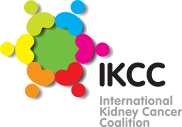by Deb Maskens, Kidney Cancer Canada
Immuno-oncology
Immuno-oncology was the topic everywhere for many types of cancers including kidney cancer. Until any immune-oncology drug is approved for kidney cancer, patients can access them through clinical trials. The first data to report will be for nivolumab (PD-1) possibly later this year. Words of wisdom we heard from many of the medical experts include:
- Patients need to investigate thoroughly: these clinical trials are not right for everyone. Some of the toxicities can be long-term (permanent) and even the most experienced nurses are still learning how to manage the side effects which are quite different from those of targeted therapies. While there has been a great deal of media attention about immuno-oncology, we still have much to learn about “which patient” will respond.
- Early indication is that some of the more aggressive kidney cancers (Fuhrman grade 4 or sarcomatoid mRCC) may respond better. It may be true that the worst-acting tumours will be the best responders, perhaps due to the high number of genetic mutations.
- Patients on clinical trials should, whenever possible, consent to a biopsy if a tumour is accessible. Rationale is that if you happen to be a responder or not, you will know why – and the results from the biopsy could help direct decision-making for future treatments.
- Biomarkers for immune-oncology treatments are being sought, but none is currently predictive of response.
For information about clinical trials for mRCC including immune-oncology trials, please contact Kidney Cancer Canada or your local country support organisation. This information changes quite quickly. Trial sites are coming online across Canada in major centres and in many other countries as well.
Targeted Treatments
One pleasant surprise was to see a new drug, Lenvatinib in combination with Afinitor achieve excellent results in the 2nd line. This trial was conducted in 37 centres in 5 countries. All patients had one prior VEGF therapy. The median to progression in the 2nd line was 14.6 months, indicating that further studies with this new drug are warranted.
Several investigators noted that there could be big changes in the 2nd line after trials for cabozantinib and also nivolumab report later this year. We are eagerly awaiting the results of those trials.
Non-Clear Cell / Papillary RCC
Often called a “basket diagnosis”, non-clear cell RCC is not one but many different diseases. Trial results from the ASPEN trial for non-clear cell mRCC included 108 patients in 3 countries with many “unclassified” histologies, papillary, and chromophobe. Results favoured sunitinib (Sutent) over everolimus (Afinitor), but neither treatment was particularly impressive in this group of mixed patients. Some genetic profiling from other studies indicates that possibly a TSC1 or TSC2 mutation may indicate likelihood of response to everolimus (Afinitor). Other studies are underway with cMET inhibitors (including in Canada) and with Avastin/Tarceva for papillary only.
Summary conclusion is that patients with non-clear cell mRCC should be referred to expert centres and enroll in clinical trials whenever possible.
Summary
The overall message from ASCO 2015 is that the field of cancer treatment is changing rapidly. Words such as “practice-changing” and “breakthrough” were heard often, but there is also room from some caution while we await more information from upcoming trials.
Most of all, we heard from many, many presentations that we are ALL indebted to the many cancer patients and their families who have engaged in previous trials and who will continue to contribute to moving this research forward. Thank you!
As always, your questions, thoughts and insights are welcomed!
— Deb Maskens, May 2015

